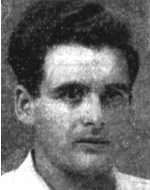Son of Sabina and Hermann, was born on 12.12.1923 in the city of Stuttgart, Germany, to a father and mother born in Poland, who was treated as a Jew by the German children at school and had been absent from school for two consecutive weeks Without the knowledge of his parents, and then refused to study and be educated as a German citizen, and as a young boy he began to work in a factory, and only in the Jewish youth association to which he joined did he find warmth and social life, “And did two years of education and training in Kibbutz Ma’abarot, out of an internal resistance to theoretical studies Rhett and devotees economy works, including acclimatized soon as soil born and took an increase fodder Mikveh Israel. When he was 17 he joined the Palmach first. He was accepted as a member of Kibbutz Ma’abarot and occasionally worked there, but most of his time throughout the years was devoted to the service of the homeland. Menahem completed training courses in sabotage and squadrons, then took a naval training course, along with the late Haviva Reik, and volunteered to go beyond enemy lines in Europe, but he was not sent. Y. After this period Menahem was transferred to command and training in the German Department of the Palmach, which was intended for sabotage and underground activities in case the Germans, who had already reached the Egyptian border, would conquer the country. When this fear passed, he was given a short vacation for his marriage. In January 1945, he was joined with the “German Department” of the Jewish Brigade, where he underwent training with the rank of Private, and when they reached Italy the war ended. He served for a short time in the transport corps, but mainly worked in the aid of illegal immigration (in a daring and dangerous operation, discovering a hidden mountain path in the Alps to transfer refugees from Austria to Italy). In his hometown he tried to trace the traces of his parents, who had disappeared on the death train to Poland. In July 1946, he was discharged from the army, received leave from the Palmach and worked in Kibbutz Maabarot in a tractor and later in Badmut, where he concentrated on sports activities and youth and adult training, and in the summer of 1947 he was again recruited to fight underground organizations, Etzel and Lehi. In February 1948 he was recruited to full service in Palmach, “H. Completed a course for instructors and armored commanders. Was sent to Hulda to train heavy machine guns, accompanied the last convoy to Jerusalem before the siege, trained at the base of the Harel Brigade of the Palmach in Kiryat Anavim, and for some time was commander of the Castel, Aviv in the only vehicle that tried then “Derech Sheva” (“Burma Road”) and was appointed commander of the Lehi men’s camp (who joined the regular army) at Tel Litvinsky. During the difficult days of the test, the two sides forgot their hostility from yesterday and cooperated in a fair friendship. Was the right hand of Major General Yitzhak Sadeh in the organization of the 8th Brigade and an armored battalion that later served as a company commander. After a day of sleepless work, his company was called on Wednesday morning (11.6.1948) – an hour before the first cease-fire to take effect – to stand up against the superior and armored force of the Legion The Arab, who had driven the small Irgun unit which had held on to its Jews, began an attack on the Legion’s armored vehicles as he stood in his armored turret.The driver was killed and the armored vehicle was set on fire. Menachem was still there until he dismantled the two machine guns and when he jumped out through his upper opening he was hit in the chest with a cluster of bullets. With the last of his strength, he gave orders to stand up against the enemy and call for reinforcements and medical help (it was in the afternoon, when the truce was already in force), and in the end he asked his men to leave him alone and escape. Wanted to be buried in his home, and indeed, when the fire of battle was brought, he was brought to eternal rest in the cemetery at Kibbutz Ma’abarot. After his fall, he was granted the rank of captain. His daughter, who was born after his death, was called Ronit Nechama (in memory of Menachem Aviya). Kibbutz Maabarot issued a pamphlet on its 30th anniversary
